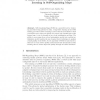Free Online Productivity Tools
i2Speak
i2Symbol
i2OCR
iTex2Img
iWeb2Print
iWeb2Shot
i2Type
iPdf2Split
iPdf2Merge
i2Bopomofo
i2Arabic
i2Style
i2Image
i2PDF
iLatex2Rtf
Sci2ools
129
click to vote
ICNC
2005
Springer
2005
Springer
A Game-Theoretic Approach to Competitive Learning in Self-Organizing Maps
Abstract. Self-Organizing Maps (SOM) is a powerful tool for clustering and discovering patterns in data. Competitive learning in the SOM training process focusses on finding a neuron that is most similar to that of an input vector. Since an update of a neuron only benefits part of the feature map, it can be thought of as a local optimization problem. The ability to move away from a local optimization model into a global optimization model requires the use of game theory techniques to analyze overall quality of the SOM. A new algorithm GTSOM is introduced to take into account cluster quality measurements and dynamically modify learning rates to ensure improved quality through successive iterations.
Related Content
| Added | 27 Jun 2010 |
| Updated | 27 Jun 2010 |
| Type | Conference |
| Year | 2005 |
| Where | ICNC |
| Authors | Joseph P. Herbert, Jingtao Yao |
Comments (0)

